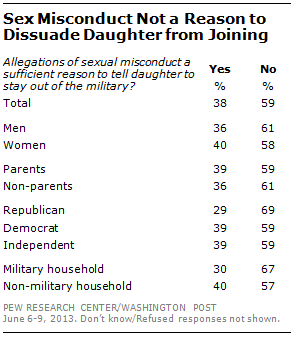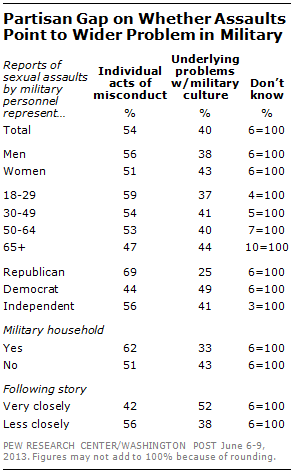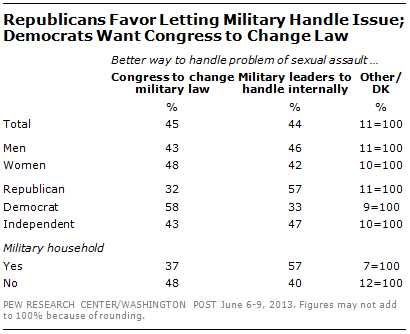Overview

A substantial majority of Americans (81%) view sexual assault in the military as an extremely or very important issue. But the public does not believe the problem of sexual assault is a bigger problem in the military than outside it: Just 11% say it is more of a problem inside the military, 23% say it is more of a problem outside the military, while 63% say it is about the same.
And while 40% say the reports of sexual assault in the military represent underlying problems with military culture, a majority (54%) says they represent individual acts of misconduct.
The latest national survey by the Pew Research Center and The Washington Post, conducted June 6-9 among 1,004 adults, finds that the public is evenly divided over whether the better way to handle the problem of sexual assault in the military is for Congress to make changes in military laws (45%) or for military leaders to address the problem internally (44%).
By 57% to 32%, Republicans say it would better for military leaders to handle the problem internally. By about the same margin (58% to 33%), Democrats say it would be better for Congress to make changes in military law.
About half of Americans (52%) have a great deal or fair amount of confidence that military leaders will make the right decisions when it comes to the problem of sexual assault in the military, but just 36% express at least a fair amount of confidence in Congress on this issue.
This in part may reflect the wide gap in underlying opinions about the two institutions: In January, just 23% viewed Congress favorably, while a month earlier 71% had a favorable opinion of military leaders.
The new survey finds a sizable gender gap in views of the seriousness of this issue. About half of women (51%) say the issue of sexual assault in the military is extremely important, compared with 37% of men. But similar shares of men (56%) and women (51%) say the problem is rooted in individual misconduct rather than military culture.
Moreover, there are no significant gender differences in views of whether the military or Congress can better handle this problem: 48% of women favor Congress making changes in military laws while nearly as many (42%) say military leaders can better deal with the problem internally. Men also are divided (46% military leaders, 43% Congress).
What to Tell a Young Woman Who’s Thinking of Joining Military

Most Americans (59%) say that if they or a friend had a daughter who was thinking of joining the military, the allegations of sexual misconduct would not be a sufficient reason to tell her to stay out of the military. About four-in-ten (38%) say these allegations are a sufficient reason to dissuade a young woman from joining.
These views are largely unchanged from 1997, amid widespread allegations of sexual harassment in the armed forces. In a survey by the Associated Press, 65% said allegations of sexual misconduct in the military were not a sufficient reason to tell a young woman interested in joining the military not to join, while 31% viewed the allegations as a sufficient reason to discourage her from joining the military.
Comparable shares of women (58%) and men (61%), as well as parents (59%) and non-parents (61%), say reports of sexual misconduct are not a sufficient reason to tell a daughter not to join the military.
Perceptions of the Sexual Assault Problem
Just 11% say sexual assault is more of a problem in the military than outside it; twice as many (23%) think it is more of a problem outside of the armed forces, while 63% say it is about the same in and out of the military.
While nearly identical percentages of women (9%) and men (12%) say sexual assault is a bigger problem in

the military, men are more likely than women to say it is a bigger problem outside the armed forces (29% vs. 17%). A larger majority of women (70%) than men (57%) see the problem about the same inside and outside the armed forces.
People who have served in the military or live in a household with someone serving or a veteran have similar views as those in non-military households about the problem of military sexual assault. Nearly identical majorities in both groups say it is about the same inside the military as outside it (63% of military households, 64% of non-military households).
However, more people in non-military households (43%) than in military households (33%) say sexual assault reports represent underlying problems with military culture.
Republicans by more than two-to-one (69% to 25%) say reports of sexual assault in the military represent individual acts of misconduct. Democrats are more evenly divided, with 44% saying they represent individual acts and 49% saying they point to underlying problems with military culture.
Wide Partisan Gap over How to Handle Military Sexual Assaults

Republicans and Democrats have sharply different views about whether military leaders or Congress would be better able to handle the sexual assault problem. By 57% to 32%, Republicans say it would better for military leaders to handle the problem internally.
By about the same margin (58% to 33%), Democrats say it would be better for Congress to make changes in military law.
People in military households also are more likely than those in non-military households to say that military leaders can better handle the problem of sexual assaults internally (57% to 40%).
There also are large gaps in confidence in military leaders to make the right decisions on the problem of sexual assault in the military. While 62% of Republicans express at least a fair amount of confidence in military leaders, only about half of Democrats (47%) say the same. Democrats (47%) are more likely than Republicans (29%) to have at least a fair amount of confidence in Congress to make the right decisions on this issue.
Most of those in military households (63%) have confidence in military leaders to do the right thing in handling the problem of sexual assault; just 31% have confidence in Congress. Among non-military households, 49% have confidence in military leaders and 38% have confidence in Congress.




